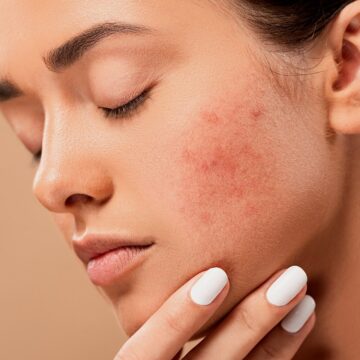
- Acne is caused by inflammation.
- This inflammation can cause skin discoloration and deep pits on the skin.
- Cleaning out your pores using a DIY method, and picking on your pimples can only cause more damage to your skin.
Inflammation causes acne. Depending on your skin type and the degree of inflammation, the blemish could leave discoloration or a textural change in your skin as it tries to heal, according to Dr Ivy Lee, a California-based dermatologist, and UCLA’s assistant clinical professor of dermatology. Some innocent habits may also cause your acne to scar. Here are some of them:
1. Skipping sunscreen

Sun damage can cause your acne to scar, and acne treatment products also increase the skin’s sensitivity to UV rays. According to Dr Lee, sun damage can cause discoloration and cause acne to take more time to heal.
2. Popping your pimples

Popping your pimple only increases the risk of discoloration and scarring, explains Dr Lee. Bacteria from your hands can infect your pimples, and create more inflammation.
3. Clearing your pores

Cleaning your pores with metal tools or your fingernails to extract pimples or blackheads can cause more trauma and inflammation to your skin, says Dr Kally Papantoniou, FAAD, a board-certified dermatologist. Leave the job to trained professionals, or if you really want to do DIY a method, clean your tools before and after each use to prevent spreading bacteria, and put a tissue paper between the metal and your skin, says Dr Papantoniou.
4. Staring at your pores

Staring at your pores in the mirror will only trigger an urge to pick at your pores. If you keep touching your acne, it can cause more damage, breakouts and scars, says Dr Papantoniou.
5. Using a washcloth to wash your face

Washcloths, exfoliating mitts, and mechanical cleansing brushes may feel like they’re deep cleaning your pores, but in truth, they can be too harsh on your skin and strip off its protective barrier, says Dr Lee. Using these harsh cleansing tools on your face may damage the protective barrier, leading to irritation, sensitivity, and vulnerability to bacterial infection, which can all cause acne scars.
6. Wearing heavy makeup

You may be tempted to cover up blemishes with foundation and concealers, but these products can irritate the skin and worsen acne scars. Dr Lee recommends choosing oil-free and non-comedogenic makeup products.
7. Using the same treatment for years

Having a regular skin-care routine that prevents acne is an excellent first step. Still, if acne scars are becoming unmanageable, it’s best to visit a dermatologist who can recommend painless blue light therapy to kill the bacteria that causes acne and a facial that can treat your skin issue, says Dr Papantoniou. Regular monthly facials can reduce acne breakouts and clean out pores professionally, which can reduce the risk of scarring.
Source: Reader’s Digest
